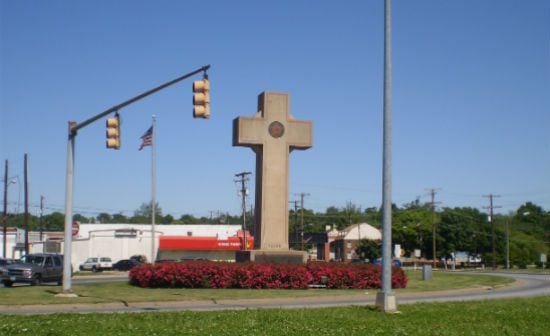• Nationalize insulin. Do it yesterday.
• I’m a Baptist, so I believe it’s bad and dangerous to both church and state when government officials determine that my religious teachings and symbols — or those of others — aren’t really religious at all, but just vague secular symbols with vague secular meanings. Or probably no meaning at all. Those sacred symbols, these officials say, are just hoary remnants of a forgotten past, the lingering perfume of an empty vase.
The Supreme Court ruled today that there’s nothing uniquely Christian about a giant cross. The cross, seven justices said, is just a vaguely American thing, just background noise in support of some vague civil religion and general public support for … well, for war, apparently. What does the cross mean? It means We the People love and support war:
The Bladensburg Cross, which stands at the center of an intersection, was erected between 1919 and 1925 in memory of soldiers from Prince George’s County who died in World War I. A cross was chosen, according to the court ruling, because the Latin cross “had become a symbol of the war.” The Maryland-National Capital Park and Planning Commission acquired the land the monument occupies in 1961. …
In an opinion delivered by Justice Samuel Alito, the Supreme Court ruled that the cross does not, in fact, violate the establishment clause. “Even if the monument’s original purpose was infused with religion, the passage of time may obscure that sentiment and the monument may be retained for the sake of its historical significance or its place in a common cultural heritage,” Alito writes.
So now, officially, the cross is an obscure sentiment that we can keep around because it’s just kind of always been there, in the background, as something we drive past. That’s not primarily a legal or constitutional argument. It is, primarily, a theological assertion. And it is an explicitly and pervasively sectarian theological assertion.

I think that’s a Very Bad Thing. I think it’s Bad Theology because I do not believe this is or should be or can be the meaning of the cross. And I think this pushes aside and leaves less space for those who strive and attempt to believe that the cross can mean anything else, or anything at all. (Meaning is difficult to discern when a majority of justices tell us that a monument called “the Peace Cross” is “a symbol of war.” Orwell’s estate should sue for royalties.)
I’ll try to make the best out of this official theology by noting that it might, in a perverse way, help us to recall the original secular-ish meaning of the cross. It was originally a terrifying symbol of imperial might. The Roman cross was not really a secular symbol for the empire because Rome didn’t have a First Amendment preventing emperors from totalizing its claim of sovereignty over even the conscience and faith of its subjects, but it was a symbol of the sectarian state and an assertion of that state’s absolute power.
“Caesar is Lord,” was what the cross originally meant. The first Christians rejected that, claiming instead that “Jesus is Lord.” And they reclaimed the cross as the symbol of that — as “the foremost symbol of the Christian faith, embodying the ‘central theological claim of Christianity: that the son of God died on the cross, that he rose from the dead, and that his death and resurrection offer the possibility of eternal life.'”
That’s from the Baptist Joint Committee’s amicus brief, quoted in Justice Ginsburg’s dissent to today’s ruling.
• “‘Throughline’ Traces Evangelicals’ History on the Abortion Issue.” A good basic summary from NPR. I look forward to listening to the full podcast series and report. (Spoiler alert: Abortion-is-murderism is, for white evangelicals, a political/religious view that’s younger than the Happy Meal.)
• “Bodies in Seats.” Casey Newton sits down with the underpaid and traumatized contractors who do the ugly work of screening out violence, child pornography, and other vile material from Facebook. These are the people charged with protecting the American public from the worst of itself — a task that leaves those who do it suffering from burnout, PTSD, and other health issues.
It’s a horrifying look at a horrifying reality — one Facebook seems more inclined to monetize than to fix. Think of all the awful things that get posted and remain posted on Facebook. Now think of what the stuff that gets removed must look like. Yeah. Except according to the moderators Newton interviews, it’s even worse than you’re thinking.
Newton also speaks with Arun Chandra, Facebook’s “vice president of scaled support,” who has been tasked with improving working conditions for the contractors wading through the cesspool of the tech-giant’s content moderation efforts:
He told me that in the Philippines, content moderation has become an attractive career track, and that everywhere he goes, he meets moderators who take great pride in their work. “The level of enthusiasm people have is amazing,” he said.
Imagine what it means for America’s reputation, influence, and soft power abroad that there are now tens of thousands of people in the Philippines and all over the world whose image of America is based on their work as content moderators for Facebook.
• “Publishers Plead With Trump Not to Impose a China ‘Bible Tax’” (via):
Proposed tariffs on $300 billion in Chinese goods would include printed materials, which would especially affect Bibles and children’s books predominantly produced in China because of the unique paper, printing technology and skills needed, company and trade group officials testified during the second day of a seven-day hearing on the proposed duties Tuesday.
“We believe the administration was unaware of the potential negative impact these proposed tariffs would have on Bibles and that it never intended to impose ‘a Bible tax’ on consumers and religious organizations,” Mark Schoenwald, chief executive officer of HarperCollins Christian Publishing, told a panel of officials at the U.S. International Trade Commission.
A 25% tariff would make it difficult to continue printing some formats and raise prices, leading to a Bible shortage that would hurt the Christian bookseller market, as well as ministries, churches, nonprofits and other religious organizations that couldn’t afford them, Schoenwald said.
There also is no viable alternative to the U.S. children’s books printed in China because of the waterproof and nontoxic materials used in some cases, as well as China’s investment in recent decades in needed equipment, said Daniel Reynolds, CEO of Workman Publishing Co. in New York.
Most of the commentary I’ve seen here is about the ironic consequences of Trump’s flailing trade spasms, which is fair. But I also want to call shenanigans on the claims that Bibles somehow must be “predominantly produced in China because of the unique paper, printing technology, and skills needed.” That’s all corporate BS for “cheap parts and labor.”
And if Reynolds’ claim that China somehow has stricter standards about nontoxic materials than the US does is true then holy cow — we need better laws and standards and practices here in America. (We probably do need those, but I still doubt Reynolds’ claim that China’s laws and practices are any better.)
I get that there can be an innocently mission-driven line of argument for why America’s Bible publishers would want to produce these English translations as cheaply as possible. The cheaper the Bibles, the more you can print, and the more you can print the more you can give away, and the more you give away the more people will be saved from the eternal fires of Hell, etc.
I understand and appreciate that argument. But, nah, this is really just about money, profit margins, and higher pay for those at the top of the money chain.
• Sticking with Guy Clark for a bit. The title for this post comes from “The Cape,” which is one of those songs that sounds better from Old Guy Clark than from Young Guy Clark.












